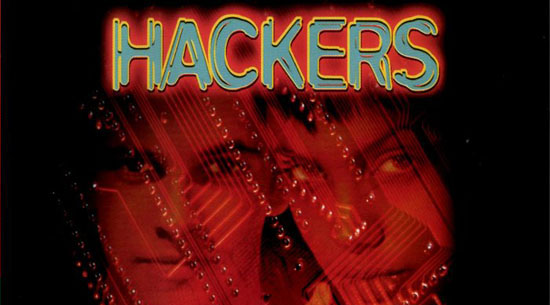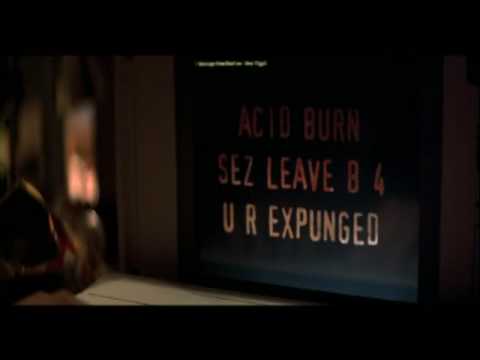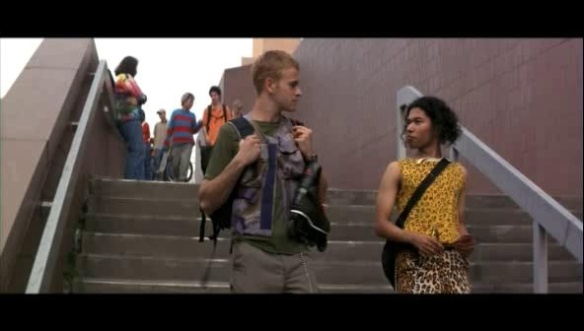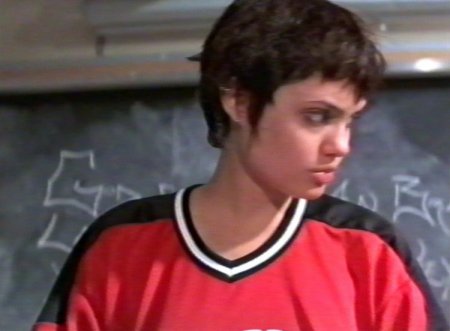Zero Cool is techno-Odysseus…the young hero, brazen and foolish, who initially refuses the call to
action, summons the courage to follow the path to self-discovery. Beneath the mask, Dade Murphy–the
boy genius–immerses himself in computers at an early age. Like Icarus he overreaches; his
precocious ambition is punished and he must lay dormant until the coming of manhood.
The hero cannot thrive in hip, cozy Seattle, then at the peak of its popularity as the “grunge
capital of the world.” He is called forth to the dangerous urban jungle of New York. As Paul Auster
says, New York is a place to get lost, both geographically and mentally. You are thrown into chaos and must find your way about the place–it’s about self-orientation, stability, and growth. Dade
comes from a broken nuclear family–divorced parents– a schism in the comfortable postwar societal
organization. The trauma of separation facilitates the adoption of new values. Dade is left
fatherless; he becomes his own father (and therefore his own god).
An early important scene in the movie shows the long flight from Seattle to New York. This is the
beginning of the journey, which is highlighted by Orbital’s “Halcyon (and on and on)” as background
music–this is the perfect pulsating soundtrack to the dream world of New York in the mid 90s. It is mental disorientation, the breaking up of all that was taken for granted–the family, the suburbs,
childhood innocence, etc. All of that is gone and Dade will soon be thrust into the world of night. Flying over the city, Dade scowls as he contemplates the architecture of late-capitalist
despair,
and the illusions of serene suburbia fade. The movie shows the grid plan of the city morph into
computer hardware, with bits of data zipping around like automobiles. This may be Dade’s
imagination, expressing his desire for a completely silicon world. His wish will one day be
fulfilled; the complete mediation of technology into our daily lives is not so far off anymore.
Dade is settled in his cramped New York apartment, and on his 18th birthday he is back on his
computer; he is like a child at play.
He stays up till 4 am–the mythic hero never sleeps, he is always playing, wandering, learning, gaining strength. He is confronted by a rival and loses an irrelevant hacking competition, which is a minor setback to be corrected later in the film.
The early scenes of Dade’s existence in New York depict him as a loner, adjusting to the ways of the city. He has no friends and lacks confidence. His technological know-how gets the attention of a fellow hacker though, and he is invited to join a small group of cohorts all sharing the same interest in computer hacking. It is a group of misfits, nonconformists–the hip, smart people you always wished you could
hang out with in high school. They all have secret names. They break the ancient taboo of renouncing
one’s given name–it is no longer sacred to them. They create their own name, and consequently their
own persona.
Sexual androgyny is is weird peripheral theme in the movie. It is not essential to the main plot, yet it seems to have significance in the general subculture this movie represents. Dade is attracted to the boyish, lanky Kate Libby, played by a young Angelina Jolie. She has a cropped haircut and dresses like a boy, yet Dade drools over her. Kate fantasizes about Dade wearing a dress, and this image of him inflames her desire for him. What is going on here? In Dade’s case, the
absence of the father
and possible strengthening of the Oedipal complex within him would explain this ambiguous
desire. His identification with his mother alters his perception of an ideal mate. In Kate’s case, it is more obscure. We know that her mother is a radical feminist writer, but we
know nothing about her father.
Perhaps Kate internalized some of her mother’s philosophical ideas about the
artificiality of gender–the idea the gender is socially constructed and arbitrary. Kate therefore is comfortable with a more
feminized man–a late 90s/early 2000s man.
There is still a lingering wish to be dominated by the male though. Although Kate is more self-assured and competent than Dade initially, by the end of the film she willfully, yet somewhat reluctantly, acknowledges him as the
alpha male of the group.
After they are all captured by the Feds, Dade says of
Kate that, “She doesn’t know shit about computers. She’s just my girlfriend.” Kate would have been enraged by this comment earlier in the film, yet when he says it, she thanks him for trying to
protect her.




